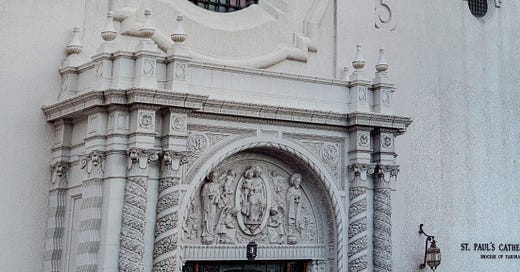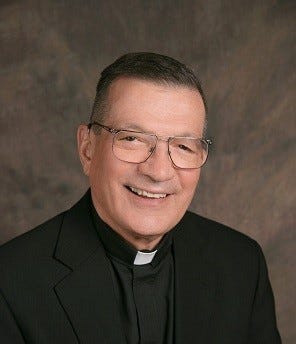
Former Yakima bishop reprimanded by pope for ‘mistakes’
News: 'Vos estis lux mundi'
The Vatican has issued a formal reprimand to the former bishop of the Diocese of Yakima, Washington, according to media reports confirmed to The Pillar by diocesan officials.
Bishop Carlos Sevilla, SJ, was formally reprimanded by the Vatican over his handling of allegations of clerical sexual abuse in the eastern Washington diocese. Sevilla led the Yakima diocese from 1996 until his retirement in 2011, when he was succeeded by Bishop Joseph Tyson.
But while Sevilla has confirmed he received a formal rebuke from Pope Francis for “mistakes” he made in office, it has not been disclosed publicly, or to the Yakima diocese, what those mistakes were, and what the Vatican-ordered investigation actually concluded. The unspecified rebuke raises new questions about the use of secrecy in Vatican investigations into bishops accused of negligence or abuse of office.
The rebuke was first reported Sunday by the Yakima Herald-Republic. According to the newspaper, an investigation was conducted last year into Sevilla’s handling of cases of clerical abuse and misconduct, and into allegations that diocesan employees were subject to retaliation for raising concerns about the handling of allegations.
The investigation into Sevilla was carried out by Archbishop Paul Etienne, who became Archbishop of Seattle, the provincial metropolitan see, in September 2019.
The Herald-Republic reported that the investigation followed a 2019 complaint under the norms of Vos estis lux mundi, the policy issued by Pope Francis in the wake of the Theodore McCarrick scandal.
Bishop Sevilla confirmed the reprimand to the Herald-Republic Sunday, telling reporters that “the investigation has concluded and I received a papal reproof. It means I made mistakes and could have done better. I accept that judgment.”
But the exact reasons for the reprimand, and the nature of the “mistakes” made by the bishop, remain unclear.
Msgr. Robert Siler, vicar general and spokesman for the Diocese of Yakima told The Pillar Monday that neither he nor Bishop Tyson had been given a copy of the report’s conclusions.
Siler confirmed to The Pillar that the diocese had fully cooperated with Etienne’s investigation, and made available all necessary diocesan records, both to investigators and for Sevilla’s defense.
Sevilla’s case points to unresolved questions about the prospect of transparency in the Vatican’s handling of complaints against bishops — especially as Vos estis lux mundi is now undergoing an internal Vatican review, after its initial three-year experimental period.
Several prominent experts and abuse survivors advocates told The Pillar in June that there remains room for improvement in its text and application.
Despite repeated calls for more transparency in the process created by Vos estis, which usually sees accusations against a bishop investigated by the local metropolitan archbishop, the Vatican rarely, if ever, confirms the details of such cases, and is often reluctant to confirm an investigation into a bishop is even underway — a procedure markedly different from the public and transparent handling of allegations against priests used in the United States.
A Vos estis lux mundi complaint against Sevilla was filed in 2019 by Robert Fontana, a former diocesan evangelization director, who says he faced retribution after raising concerns about the diocese’s handling of allegations of clerical misconduct.
The former diocesan employee said he became aware in 2003 of images naked boys and adolescent males on a priest’s computer and reported it to diocesan officials. While the priest, Fr. Darell Mitchell, was removed from ministry, law enforcement did not press charges. Fontana says he and Frank Murray, a parish employee who discovered the images, were eventually forced from their jobs over their report.
The Yakima diocese has repeatedly denied that claim.
Yakima’s spokesman told The Pillar that there had been disagreement between Fontana and Sevilla, but that he had been receiving full pay and benefits and had meaningful work at the time of his resignation.
“Based on my own review of the files as well as first-hand knowledge, the reprimands given to Mr. Fontana by Bishop Sevilla are well-documented and were well-founded,” Siler told the Herald-Republic. “We strongly disagree that Mr. Fontana was retaliated against for the reasons he stated, or for any other reason.”
“Bishop Sevilla also offered [Fontana] a pathway to rebuild trust. He chose not to take it,” Siler said.
—
The Archdiocese of Seattle has not yet responded to questions from The Pillar about Etienne’s investigation into Sevilla. For his part, Siler told the Herald-Republic that the Vatican-ordered investigation did not interview key diocesan personnel, including the head of the diocese’s lay review board.
Fontana says he was verbally informed at a May 23 meeting with Etienne about Sevilla’s reprimand, but says he was not given details about the report’s conclusions, and was not allowed to take notes during the meeting.
According to Fontana, Etienne cited the norm of canon 1339 §2 of Book VI of the Code of Canon Law, which describes the possibility of issuing a correction or rebuke for “behavior which gives rise to scandal or serious disturbance of public order.”
It is not clear whether the rebuke refers to Fontana’s claim of institutional retaliation, or to some other claim. But given that Bishop Tyson and other Yakima officials have not been informed of the investigation’s results, it seems unlikely the Vatican sustained any institutional claim against the diocese.
Since a wave of clerical sexual abuse scandals began in 2018, at least 10 U.S. bishops have been investigated for abuse or administrative misconduct, though the terms of those investigations are rarely confirmed or discussed by Church authrotites.
Bishop Michael Hoeppner of Crookston, Minnesota was the first bishop to be investigated under the aegis of Vos estis lux mundi; Hoeppner resigned from office in April 2021, after a probe of more than 18 months into serial administrative misconduct and cover-ups.
Three other bishops, Robert Guglielmone, Nicholas DiMarzio, and John Brungardt, were cleared after Vos estis investigations into allegations of abuse.
Vatican investigations into several other U.S. bishops remain ongoing.













The heavy reliance of the notion of "scandal" is so maddening. It seems to make optics supreme. Based on what's reported here, it's impossible to tell whether the Vatican thinks Sevilla actually did inappropriately retaliate against Fontana, or just did the right thing in a way that gave rise to incorrect impressions. And what's up with these investigations constantly failing to interview obviously relevant parties? Not the way to restore trust. Thanks for the continued reporting on Vos Estis.
Personally, I think Vos Estis is just allowing the foxes to guard the chicken coop. Basically useless for restoring trust in the US bishops. Were those cleared really innocent or were they just "investigated" by friends who would never have found them guilty no matter what they did? We'll never know.